January 2, 2009
Compose a Litany of the Earth
During the nakedness of
winter when foliage is gone, we find that our Earth is far from
being barren; a new though somewhat hidden life is starting to
stir. We walk gently upon this seemingly lifeless Earth. We notice
that we can detect nature's sights, sounds, smells, and feelings
more clearly in winter. The shape of the terrain is more evident,
the skeletal forms of trees in the woods are more emphatically
revealed and, when snow is absent, the rock outcroppings are more
pronounced. The sounds of crystal clear streams give us background
music, with the birds that remain through the season adding a
special chorus. The leaves and the evergreens give their faint
scents to accentuate the winter scenes. The feeling all about is
that new life is stirring and will soon come to flower when the weak
sun's rays become stronger in coming days. Yes, winter lacks the
distractions of more active seasons. It is a time to return to the
deep mystery of life itself and to make us closer to our mother and
mothering Earth herself.
Earth, mother of the
human race,
Repository of past
civilizations and geologic ages,
Dust from which we came,
Cradle of our infancy,
Room for our romping
feet and ever stretching hands,
Schoolyard of our
intellect's quest,
Garment of our loves and
yearnings,
Lap of our sorrows and
joys,
Bearer of our
transgressions:
Marked by our heavy
footprints of time,
Eroded and scarred by
highwalls of human greed
and
negligence,
Crowned with pointed
mountains and occasional rainbows,
Comforting,
situating, directing us forward,
Welcoming new life of
every form,
Giving all space to
roam and find themselves,
Glorifying in their
presence,
Recalling through
quakes and shakes what is transitory,
Provider of the birds,
Nourisher of flowers and
plants of every kind,
Supporter of the trees,
Preserver of wildlife
Dwelling place of the
human race,
Economic commodity at
desecrating hands,
Battleground and
memorial of the warring,
Haven from sea storm and
air flight,
Autumn's last bloom,
telling of our end,
Urn of our bonds, grave
of our people.
Our home.
Prayer:
God, Emmanuel, be with us in our fresh beginnings of the year. Help
us to enliven what appears to be a lifeless season.
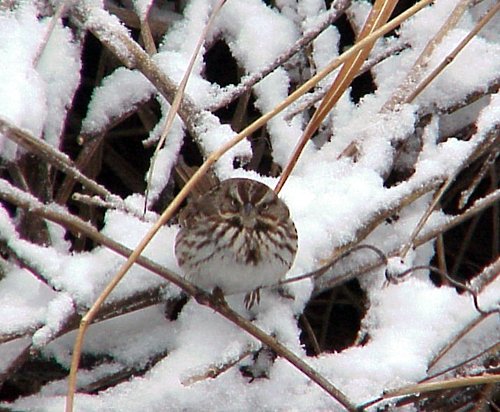
A "mad" song sparrow (Melospiza melodia) in the snow, Estill
Co., KY
(*photo by Sally Ramsdell)
January 3, 2009 Join
the 109th Christmas Bird Count
It is not too late! There
are still three days left to join this year's national bird count,
which has been going on since December 14th. Check <www.audubon.org/Bird/cbc>.
Join the thousands of volunteers who include a mix of generations of
family members who can participate in the oldest American citizen
science project (since 1900), which improves wildlife conservation
awareness and protective programs. The specific count is led by
experienced birders or designated "compilers." The results of the
count of sixty million birds help scientists who are engaged in this
type of environmental work to determine degree and severity of
decline or rise in bird populations.
Clusters of swallows,
flocks of crows, bands of wild turkeys or gaggles of geese make us
think all is well on the bird/fowl front, but that is not really
true when all species are considered. A wide variety of species
both residential and those that migrate are in trouble due to
habitat degradation in wintering and nesting areas. This decline
has several causes: deforestation and forest fragmentation, human
population growth, increased traffic congestion and commercial
development, construction of powerlines and roadways, and global
warming.
The 2007 Watchlist
composed by the Audubon Society and the America Bird Conservancy
includes 59 continental and 38 Hawaiian "red" or highly imperiled
species (declining rapidly) and 117 "yellow" species (declining or
rare). Since birds are heavily impacted by current environmental
conditions, we may consider feeding birds -- not just hummingbirds
that make immense treks to wintering places -- but also our
permanently resident birds. Furthermore, bird lovers promote bird
sanctuaries for the nesting and rearing of the young birds. Also
they seek to control free-ranging domestic cats -- real bird
killers. Audubon suggests improved habitat protection, partnerships
with private landowners, backyard programs for homeowners, and
stronger pollution controls (e.g., pesticides impacted the bald
eagle in the mid-20th century).
Birds are beneficial.
About one-quarter of all Americans consider themselves to be
birdwatchers; these contribute to the local economy in terms of
travel, food, lodging and equipment some $32 billion dollars, not
including state and federal taxes (U.S. Fish and Wildlife Service
estimates). But birds do more than furnish us recreational pleasure
or insect pest control. We are better because birds are in our
midst, cheering and enlivening us by their song and color and
assisting us in our praise of God. Bird variety decline is a real
loss caused by controllable human greed and thoughtlessness. A
century ago the Audubon Society started because the bird population
was in severe decline due to the gathering of colorful bird feathers
for hats, but that practice became unfashionable. Now all bird
threats need to be confronted.
Prayer:
Lord, inspire us to protect the birds around us and to learn where
the help is most needed.

Sandstone meets limestone, Carter Co., KY
(*photo
credit)
January 4, 2009
Manifest the Divine
The glory of the Lord
shines upon you. (Isaiah 60:1-6)
The Christmas story is
told and retold a million times in various formats: sermon, fireside
chat, homily, poetry, simple prayer, and yet the story is ever new
and enlivening. Audiences are different, conditions vary, but each
who hears finds present a deep-down hunger to experience the basic
message of peace and harmony. Often our concerns are blinders that
shut out the clear simple Christmas message of trust and giving. As
we experience the housing bubble burst, home foreclosures,
employment roles cut, and life savings threatened, we are tempted to
allow such distractions to overwhelm the basic message of peace.
Epiphany
means the manifestation or showing of God's glory and its discovery
by good and trusting souls. This is the peace that newborn infants
bring to parents; it is the satisfaction with work done honestly to
make a living; it is the rewards for helping to heal our wounded
Earth. We are called to help bring this epiphany to a troubled
world.
The Magi travel from a
distant land with only an extraordinary phenomenon, a guiding
brilliant star, which some strive to prove was a conjunction of
stars or planets. The Magi represented all of us, the visitors to
the Holy Land who seek peace and intend to take that peace to the
outside world. Is not the same trek ours to make as well? God's
manifestation and light is there but hidden because we must make the
effort to journey to find it and cherish what is found. The
psychological situation now, as in Christ's time, is that we
sometimes ask directions, even from worldly and evil powers, since
we do not know the way. But God is with us and through proper
spiritual discernment we can arrive at the truth.
Gold, frankincense and
myrrh are brought to the king of kings, and these three wise men
take back home the gift of Good News. This is a true exchange in
which valuable things are simply and lovingly given, and peace and
harmony are received in exchange. Thus begins the grand missionary
enterprise that extends to the end of time. The wise men faced
limits due to modes of transport and distance. We must face the
reality of selecting precious gifts, which are really simple but
full of love, for our travel mode is also limited; we leave this
world with only our love as final gift.
The Magi story of simple giving
is interwoven with Herod's jealousy and his cruelty in retaining
worldly power. The story involves changing plans, returning by
another route, the killing of innocents, and the fleeing by the Holy
Family to Egypt. Evil plots stand in stark contrast to the simple
gifts exchanged and yet both occur. The risk of taking a journey of
faith is that we, like the Magi, open ourselves to becoming
vulnerable. In trust we journey with the poor and bear risks along
with gifts of love.
Prayer:
Lord help us to manifest your
presence through the simple gifts we give, knowing full well there
are risks involved.

Droplets of water on rough-leaved dogwood (Cornus drummondii)
(*photo
credit)
January 5, 2009
List Peacemaking
Activities
We have been at war in
Iraq since March 2003 making this the second longest war (the
Revolutionary War was the longest) in American history though some
would quibble about the length of the Vietnam conflict. The
beginning of this new year presents each of us with a challenge:
how can we become true peacemakers? Merely repeating the words
"peace, peace" is not enough for words need to give way to deeds.
Now is the time to start afresh, to reconcile, to build bridges, to
dispose ourselves through silence and meditation, to do peaceable
acts at home and in community, and to make peacemaking a part of our
individual and collective lives.
Individual Practices:
Lessen stress levels by establishing a place of silence where you
can go and recover from the struggles of life. It may be a place to
walk or retreat to that is away from the rush of everyday
happenings. Within our living space we can do things as well.
Consider lowering the volume of electronic devices and limit the
time and place of running noisy appliances and equipment. Settle
internal quarrels, for things can fester if unattended. Get
sufficient sleep and rest; some who say they can do without sleep
enter the ranks of the sleep-deprived with all their stress and
inattention to the details of life -- and driving. Proper rest
extends our peace of soul, gives us a fresh outlook, and is
physically and mentally healthy. Resting is an atmosphere wherein
peacemaking may occur. The same can be said of a balanced physical
exercise program for all of us.
Community and Social
Activities: We can expand peacemaking by joining others in our
community or at broader levels. Bad relationships and conflicts
exist all around us and need to be addressed at various levels.
You may be drawn to local peacemaking through sharing resources and
helping with civic activities that confront drug abuse. You may
wish to join peacemaking organizations such as Pax Christi <www.paxchristiusa.org>
or help promote specific national peacemaking programs. A number of
years back, people like Theodore Hesburgh, former president of Notre
Dame, proposed a Peace Academy to research the causes of peace,
train leaders in conflict resolution and mediation techniques, and
serve as a clearinghouse to provide information to policymakers and
others.
Broader issues:
Peacemaking extends to the stability of our national and
international political and economic systems. We must not only pray
for global peace, but we must also encourage our elected
representatives to engage in active conflict resolution and to be
mindful of the need for dialog among all parties. We are in two
wars and know that no peace can be reached in Iraq or Afghanistan
(or in the Holy Land for that matter) unless all parties are at the
table, and the legitimate concerns of all parties are voiced and
addressed.
Prayer:
Lord, make me an instrument of peace and help me to see that
peacemaking is a priority for all of us in 2009.

A winter sky
(*photo
credit)
January 6, 2009
Plan An Annual Retreat
This may not be the
specific time for retreat-making for many of us but it is a good
planning time, a period when we lay out the year's plans that
include a retreat period.
I like to make an annual
retreat (generally at mid-year) and plan no special distractions to
divert the attention needed during that week. It is a personal
retreat; it is a sacrosanct time, for the planning and the retreat
are part of living. Some hints for planning include:
* Take quality time to
plan, for this exercise is a form of tithing of our fleeting and
precious time; planning is not a single event but should include
some daily, weekly, monthly -- and yearly spans of time. The annual
retreat should be a component of an annual plan;
* Choose a place that is
removed from distractions. If this takes some time to locate,
consider the time well spent. I make a portion or all of my annual
retreats in wooded settings (though I have had to give up rustic
camping as I age). One can discover that the annual retreat is a
wonderful opportunity to reconnect with God's creation. Others will
not want gnats and flies and so prefer a more developed or
controlled setting such as a retreat house. You may want the quiet
and minimal exterior activities and programs. The place should be
devoid of noise and activity. Youth can make retreats that involve
dialogue with others. But this is often not the case with adults
who interchange with others throughout the year and desire time to
listen and talk with God.
* Plan for a possible
change of plans or alternative time and place. It is difficult for
some people to plan ahead, whether for family, finances, future
occupation, or major decisions in life. Take a word from a
compulsive planner: we can refocus more easily when detours are
anticipated. All find changes of plans disconcerting -- unless
planned in. An unexpected change of plans can create unnecessary
stress in one's life -- something that the happy-go-lucky person
will point out quite quickly.
* Isolation may be a
distraction in a retreat and so some type of connection or proximity
to others may be desirable. Also a companion human or even a dog
may be desired or at least a telephone to contact others if need
be.
* Avoid planning for other
activities during the retreat. Part of the reason for the needed
rest is that we open ourselves to the Spirit. We cut away
distractions; we admit that we can only do one thing well at a time,
namely, here and now to listen to the Spirit. However, we may be
led by the Spirit to talk over what is happening at this time with a
spiritual/retreat director.
Prayer:
Lord, make me resolve to plan an annual retreat.

A farm in rural Washington Co., KY
(*photo
credit)
January 7, 2009
Recall Reasons for
Living Simply
Our current economic
crisis and climate change problems call us to live more simply.
What are reasons why we should do so?
* Countercultural:
Witness Value. Simple living is a testimony to the right way of
doing things. People who live a complex and materialistic lifestyle
take what rightfully belongs to others and hoard these materials.
It is America gone riot in the twentieth century by taking from
future generations so as to satisfy this generation's greed and
desire for comfort.
* Solidarity with Poor.
Simple living helps us be more like the majority of believers in
other places -- the vast numbers of people who will never rise above
a bare existence level. Failing to live with them makes us
insensitive to their needs.
* Practicality &
Creativity. To live simply is to remove extravagant excesses
and unneeded consumer goods, which half of the rest of the world
cannot possibly afford. Through simplicity we become more creative
and practical in all aspects of daily living.
* Psychological:
Wonder and Enthusiasm. The world of the wealthy is soon buried
in material things, which require maintenance and care. The wonder
of simple joys, of butterflies and sunsets, of fresh air and simple
foods, is lost in this move to gain more and better things and to
replace quality by quantity.
* Ecological: Communion
with other Creatures. We speak of sister moon, brother sun,
sister bird and brother wolf. These extended family members live
simply, and our own simplicity helps us appreciate them as fellow
creatures in God's scheme of creation.
* Physical Health.
It is far better to eat right and to exercise, to live in a way that
excess is not part of our lives. Simple lifestyles include healthy
food and balanced activities, moderation in drink, only necessary
drugs, and other safeguards.
* Environmental.
To walk gently on the Earth means using fewer materials, which
require resources to extract, fashion, and dispose of. Complex
lifestyles overload waste systems, require more water, and demand
more electricity from air-polluting non-renewable fuels.
* Relational.
Living simply and doing so with a purpose allows us to become more
neighborly and less self-centered. Thus we are able to help others
when in need, and with God's help to "save" ourselves from greed in
the act of helping to save others.
* Liberation. To
live simply requires much less time -- not more. We can discover
resources to be of assistance to our neighbor, and to pursue our own
intellectual and cultural growth.
Prayer:
Lord help us to live simply so others may simply live.

A single leaf catches the eye among a sea of winter on the forest
floor
(*photo
credit)
January 8, 2009 Simplify
Your Life in Many Ways
During these critically
challenging economic times we need to rethink our lives. Two of us
are considering reissuing the book, 99 Ways to a Simple
Lifestyle, the publication of which I directed in the 1970s.
Some examples of simpler living techniques that surprisingly are
still in fashion include:
Simplify by
down-sizing. Do you really need all that space for work or
living? Isn't it harder with too much than with a smaller amount?
Many people are or know people who desire a change in life. The
amount of domestic space requiring cooling, heating and management
is often far more than either necessary or desirable for comfortable
living. One should consider reducing space through purchase or
rental of smaller property.
Simplify by "reuse."
Become counter-cultural. Don't buy unless necessary; use what you
have; recycle what you can't use; give to someone who can make a
better use of the material; discard only when no longer needed --
and recycle the discarded items.
Simplify by insulating
walls and windows. Elders with good sewing skills can make an
immense difference in an area of sizeable heat loss in winter; they
can make beautiful quilted, insulated window shades and wall
hangings. Instructions and materials for making are easily
accessible through the Internet. Also consider adding window glazes
that curb energy loss.
Simplify through
creating comfort zones. Many Americans do not realize that they
demand lower indoor temperatures in summer than they feel
comfortable with in winter. A single established comfort zone
whether relatively high or low would save energy needed to heat and
cool; the resident should allow for five degrees higher in summer
and five degrees cooler in winter. We can withstand the "cold" at
60 degrees Fahrenheit, if we use enough blankets and clothing. In
summer 70 or 80 degrees F is tolerable.
Simplify car use and
care. Bike, walk, carpool where possible; combine trips; keep
a car in tune and with properly inflated tires; plan for a more
energy-efficient vehicle.
Simplify lawn and
grounds use. Too
much ornamental lawn is of no good purpose and will only prove a
worry. Convert this into cultivated space or "edible landscaping."
Simplify diets.
Change eating habits and choose foods that are lower on the resource
scale: consume less meat and more imitation meat products; buy and
use less prepared sugar- and fat-filled commercial foods; look for
and purchase more bulk items to save on packaging; consume fewer
soft drinks; and grow your own garden produce that can be guaranteed
to be organically grown. Apportion part of your food budget for
orphans in developing lands.
Prayer:
Lord, inspire me to champion the simple life.

The Kentucky River, Mercer Co., following a period of heavy rainfall
(*photo
credit)
January 9, 2009
Become an Eco-Traveler
We can fool ourselves and
justify travel more often than we like to admit. With fluctuating
gasoline prices that may be $2, $3, or $4 per gallon we ought to
reconsider our 2009 domestic and foreign travel plans. The following
eight guidelines from Co-op America's Travel Links are worth
remembering:
1. Travel in a spirit of
humility and with genuine desire to meet and talk with local
people; travel to meet, not conquer.
2. Reflect daily on your
experiences; seek to deepen your understanding. "What enriches you
may rob or violate others."
3. Be environmentally
friendly; use energy, water and other resources efficiently and in
keeping with local practices. Only bring necessary technological
gadgetry. Participate in local recycling programs where available.
Try not to bring into the country any containers that you don't plan
to take out.
4. Don't create barriers;
take advantage of opportunities to walk, bicycle and use other forms
of non-motorized transport.
5. Acquaint yourself with
the local customs. Be culturally sensitive, especially with
photography; folks are happy to help.
6. Realize that the people
in the area you visit often have time concepts and thought patterns
different from your own -- not inferior, just different.
7. Be economically
beneficial. Spend money so that it stays in the community. When
buying, remember that a bargain may be obtained because of low wages
paid to the producer. Don't purchase products made from endangered
species.
8. Cultivate the habit of
listening and observing, rather than merely hearing and looking.
Discover the enrichment that comes from seeing another way of life.
Travel alternatives. Maybe
this is the year for each of us to consider an alternative vacation
that may not involve much additional travel. It is the time to
travel less and handle more business by phone, conference calls, or
e-mail. And this may be the year we need to stay closer to home
with shorter and more regional alternatives. Extra guidelines
apply, if the travel is considered "eco-tourism" -- and this is
extensively treated in our book Ecotourism in Appalachia:
Marketing the Mountains.
Pack Carefully.
Think ahead on what is needed. Set these items aside and consider
what items are really not needed. So often we will be thankful for
fewer items. Always pack early.
Prayer:
Lord, we are a people who are on our pilgrim's way. Help us to
appreciate our situation and to become ideal travelers.

Ice formations along outcrop, Anderson Co., KY
(*photo
credit)
January 10, 2009
Resolve to Salt Less This Winter
Salt is necessary for our
lives; we prize it, cook with it, preserve with it, eat it and
sprinkle it about to melt the ice; we can overuse salt; that
overuse may occur on one of these cold icy days when we look for the
salt sack, and spread crystals generously over the driveway and
walks. It is so easy to do and allows us to quickly return to our
warm living room. We may even hope that the salt trucks scatter
still more salt on the public roadways on which we must soon
travel. All is well -- if we pretend that the salt disappears
immediately after the ice or snow melts. Not so. The crystals are
gone but the brine solution seeps into the soil and sidewalk cracks
and stays around unless flushed away in the rain. Vegetables,
flowers, trees and other plants may find the salt worrisome if not
destructive. Some of our favorite shade trees -- the beech, birch,
crabapple, ginkgo, hemlock, mulberry, sugar maple and white pine --
suffer from oversalting of the landscape. The brown leaf tips on
susceptible trees are sure signs of "leaf scorch" due to salting.
"Don't salt!" is often
easier said than done. Common rock salt, sodium chloride, is cheap
in its mined and mostly unrefined state. Other types of materials,
which also can produce a melted solution (provided the temperature
does not get too cold) are commercially available. The local
hardware or general merchandise stores have sodium chloride
substitutes, which are far better for the environment, but they
often cost two, three, even ten times as much as sodium chloride.
Some are inorganic non-sodium salts. Others are by-products of the
pulp industry, such as Bare Ground (one gallon at about $20
protects a thousand square feet). Some products are advertised as
needing a single application per winter season to be effective. Try
these on a small-scale first before widespread use. A cheap
material to consider, which is less environmentally harmful, but
less effective at times, is sand. Another, though bothersome due to
residue is cinders.
Winters are less severe
today and yet do occur. Trying to melt or reduce the adherence of
partly melted snow-turned-ice to pavement is tough; going out
immediately after the snow period and cleaning off before others
walk and compact the snow is far easier. However, don't be fooled
by the apparent ease and over-exert, for snow-cleaning can be more
strenuous than anticipated. It is better to clean the pavement
repeatedly during the snow storm, and shoveling is a good
opportunity for fresh air and exercise.
Moderation in all things is
an axiom that holds well for winter salting operations. This world
has too much salted once fertile land (mainly through bad irrigation
practices). The salt, once scattered, may both harm the immediate
surroundings and add to the run-off burden of the waterways, and
thus pollute downstream areas. Let us learn to work well with salt.
Prayer:
Lord, You want us to be the salt of the earth. Help us to scatter
our good deeds and less of the salt itself.

A winter scene, bathed in the warm light of the sun
(*photo
credit)
January 11, 2009
Baptism: Reassuring Us to Act
You are my beloved
son. On you my favor rests. (Mark 1:11)
God solemnly pronounces
the beginning of the Messianic journey through a public ministry by
Jesus; it is launched in a rather simple setting on the banks of
the rushing Jordan River. John the Baptist objects to performing
such an awesome task and yet he is reassured by Jesus; John
professes his unfitness for the mighty task ahead. In some way,
this dramatic second manifestation of Jesus that follows that of the
Epiphany (last Sunday) is an invitation to participate in the
mystery of the salvation process. Like all participants we feel our
unworthiness.
The divine favor
rests on the Chosen One, but that resting is a focusing, a special
gift that is not meant to be clutched as a sole possession. Water
is poured just as the Jordan is a fast flowing stream at this point
where Jesus was baptized. The rushing water manifests a coming of
the Spirit, an enlivening for the mission ahead. The rushing water
foreshadows the movement of Jesus out from his native Galilee to
Jerusalem; it foreshadows the pouring forth of Pentecost, and the
passing of the mission on to his disciples. Through the course of
Salvation History we observe God's favor resting on One, but the
descent of the Holy Spirit would also occur on each of the disciples
and ultimately on each of Christ's followers, a resting on us.
Jesus is called in vivid language through the drama of the voice
from out of the clouds.
Peter speaks to Cornelius,
"I begin to see how true it is that God shows no partiality. Rather
the one of any nation who fears God and acts uprightly is acceptable
to the Almighty" (Acts 10:34-35). Peter as leader of the apostles
begins to sense the utter majesty of the grand work of salvation and
he finds himself at a loss, being a mere human instrument in the
work ahead. All God-fearing persons are within the arena of God's
favor -- but each of us must see the need to do what is right in
order to be fit instruments in the divine plan. God's favor rests
as a gift that we certainly did not merit or have owed to us in any
way; but it is freely extended if we follow Jesus down into the
rushing river. The role of Peter is to accept the universal mission
and to bring Good News to others who will follow the pattern that
Jesus has undertaken.
Our Baptism washes away
the stain of sin and bestows new life on us. This is our
regeneration preparing us to be the bearers of Good News. Our
baptism is a launching pad, the most important moment between our
birth and our passing from this life. We cannot rest by saying
that we have been saved and that that is sufficient. We now must
respond in an individual manner through the righteous living of our
lives and the performing of good deeds that are needed in the saving
of our troubled planet.
Prayer:
Lord, make us aware of the
power of our baptism and the awesome tasks that lie ahead for us.

Frost on tender petals, Glasgow, KY
(*photo
credit)
January 12, 2009
Make a Winter 12 Veggie Soup
All of us can be cooks and
grow in the experience! I like to cook a twelve-ingredient
vegetable/herb soup. This wider variety allows for new and creative
tastes with each new undertaking at low cost and using ingredients
at hand. The number "twelve" in reference to vegetables or herbs
sounds just right. Cookbooks are nice, but leave them aside and
launch into "innovative cooking." Add your own dash of seasonings
and spices to be creative. At the time of this writing (November 5,
2008) I made a twelve-ingredient variety even though my autumn
garden has been decimated by drought. Once I made a January
twelve-variety soup totally from home grown ingredients: canned
tomato juice; greenhouse-grown vegetables ("tommy toes" tomatoes,
dill, mint, Swiss chard and Chinese cabbage); and late garden,
protected winter crops (parsley, Jerusalem artichokes, salsify,
carrots, garlic, mustard and kale).
January combinations may
include these items:
Tomato juice --
thick and red made from Romas, which can withstand a variety of
conditions, for base ingredient.
Squash or zucchini
-- kept in the root cellar for just such culinary creations and
body.
Garlic -- also
found under the mulch. Garlic adds that distinctive and best liked
of all cooking aromas.
Carrots -- just dug
from the garden when not frozen for these are filled with
vitamins needed in winter.
Salsify -- a truly
winter root vegetable (also known as oyster plant) that has all the
taste of seafood itself along with its own distinctive
texture.
Jerusalem artichokes
-- also fresh from the garden for added gourmet touch at the
end of the cooking process.
Parsley -- from
the snow banks where it is fortified with its natural sugars to
withstand the cold for flavor.
Swiss Chard or
Collards -- from the greenhouse or protected areas for color.
Kale -- from the
temporary cold frames in the garden for green bulk.
Mustard -- under a
cloth cover, able to endure the early winter until well into January
in Kentucky.
Dandelions --
hidden under the mulch cover and able to add a special batch of
nutrients to the mix.
Dill -- a final
greenhouse remembrance of seasons past.
Cooking: The
pepper/tomato juice base (one quart of thick, canned juice with one
to two quarts of water added) is brought to a boil, and ingredients
added after cleaning and dicing. Add black pepper and soya sauce
but no salt because the juice has canning salt present. Some cooks
prefer sauteing, but I add the onions, garlic and aromatic herbs
last. The four-liter soup mix is boiled for about one hour and then
left on a simmering low heat until time to serve. Add creative
final seasoning.
Prayer:
Lord, help us to enjoy cooking and sharing our soups.

A Kentucky sunset
(*photo
credit)
January 13, 2009 Begin
Small through Community Regeneration
Profound changes occur at
the grassroots when people both see their needs and realize that
they are instrumental in making the effective changes required to
revitalize our often neglected local communities. Often today
resources have been drained from the communities with little
replacement or encouragement from regional, state or national
governmental agencies. While all work cannot be expected to be
completed at this local level, still the Principle of Subsidiarity
directs us to see the importance of grassroots organizations and
activities. One such grassroots project was developed by Rodale
during the 1980s (though the project is now defunct); "Community
Regeneration"(CR) had twelve guidelines:
* CR has a hopeful outlook
and goes beyond identifying problems and points to positive and
constructive solutions;
* Communities are not
merely economic entities. They are social, cultural and spiritual
places as well;
* Change begins with small
steps that provide a sense of accomplishment, hope, possibility and
local control;
* The economy, environment
and overall quality of life are linked and must be considered
simultaneously;
* People, not policy, are
the primary focus. Don't assume that all the answers will come from
legislation;
* CR emphasizes imagination
and creativity and recognizes the possibility of many different
answers to one question;
* CR appreciates diversity
and moves beyond the adversarial, identifying common ground and
building cooperation;
* An environment of CR
reinterprets and redefines the concepts of progress, development,
growth, security, health, and wealth in a more positive light;
* People in community are
the only ones who can decide what is best for them and must be so
respected by outside experts;
* Residents must articulate
their own goals for the future and their own conception of
"progress." All development plans must proceed from that vision;
* The community must respect
its heritage;
* Identify and build on
capacities rather than just focusing on trying to meet immediate
needs.
Prayer:
Teach us, Lord, to revitalize our local communities through basic
guidelines that give support to the local participants.
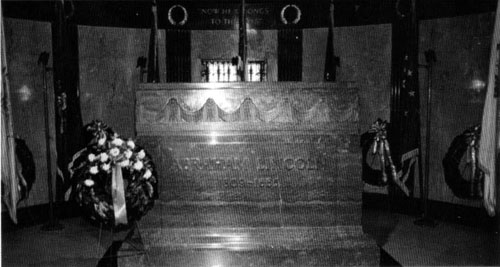
The tomb of Abraham Lincoln
(*photo
by Mark Spencer)
January 14, 2009
Launch the Gardening Year
This frigid winter day in
January is a good time to launch the gardening year for there are
always some preliminary things to do. Certainly it may not be the
time to turn the soil, but the following twelve suggestions are
worth considering now:
1. Determine to garden
well during the coming year and work out how you will secure the
space to garden. The available space may be so small that the best
plan is grow in pots or vertically on trellises;
2. Decide and lay out
where you are going to garden and determine which varieties are
worth the effort. Select varieties that are compatible with the
limited space;
3. Consider a fresh water
source for small-scale irrigation. Refrain from using chlorinated
municipal water if at all possible;.
4. List perennials
present on the land and any additional berries or fruit trees that
you may find interesting;
5. Put your garden tools
and garden supplies in order;
6. Collect seed catalogs
and prepare a listing of needs;
7. Inventory your own
home seed supply especially for those that are heirloom varieties
that you have saved or exchanged;
8. Go ahead and
exchange/order your seeds today;
9. Sow brassicas and
celery in greenhouses for early plants;
10. Prepare hotbeds;
11. Harvest the remainder
of last year's root crops when weather permits; and
12. Plan specific floral
interplanting with vegetables.
Gardening is for all who
challenge the iron-clad distinctions between experts and
inexperienced and between producers and consumers. We can fulfill
our food needs with what we produce, and we will do this in
environmentally friendly ways. We can become gentle
revolutionaries who believe in the power of starting small at the
grassroots, and gradually influencing others to make their own
changes. Gardening involves to some degree all the different
seasons, and January is no exception. We anticipate the exquisite
pleasure of picking tomatoes, digging carrots, gathering crisp
greens and just enjoying gardening during the growing season.
Prayer:
Lord, energize us to get started with the small preliminary
exercises needed for a successful gardening year and to have the
energy to carry on throughout 2009.

Reaching for the sky
(*photo
credit)
January 15, 2009
Eradicating Racist Residue
Today on the birthday of
Martin Luther King we recognize that within a week we will witness
the inauguration of the forty-fourth president of the United States
-- and Barack Obama is to be the first African-American
commander-in-chief.
At the start of Obama's
administration we ought to re-examine our racial attitudes, which
can be improved over time through effort. So often we say we have
no biases, and yet if we are perfectly honest, we discover them
lurking inside. We are all products of our longtime racist culture
and it simply takes time and determination to root out those hidden
elements that express themselves against black folks or Hispanic
migrants or native American tribes, or former national enemies. The
story of slavery in our American past or the interning of
Japanese-Americans during World War II is a vivid example of our
shared cultural history. We always need to ask ourselves some basic
questions:
* Am I a racist in explicit
ways or through preferences for hiring, interacting, conversing and
associating?
* Do I show racial
preferences in speech? I once knew someone who I could predict what
race he was speaking with by the way that he answered the phone.
* Do I harbor stereotypes
of people of a different color or race?
* Do I tell or tolerate
racially or religiously-based jokes which disparage others?
* Do I give preference to
people of a certain race over others who are not of that color?
* Have I tried to overcome
the barriers that separate us, and tried to help bring about full
equality among the races?
* Do I champion a program
of restitution for descendants of slaves who helped build this
nation for virtually no compensation?
* Do I believe in
affirmative action or has that day passed? Do I have an alternative
plan that would improve race relations? Do I support civil rights
issues? the goals of the NAACP?
* Do I pray for and conduct
my life so that full integration of the races will occur in this
country? Do I welcome the coming administration with no racial
bias?
* Do I show equal concern
about American and the developing world's health and hunger
problems?
Prayer: Lord, help
me to break down the barriers that separate us as citizens of one
nation and our world.

A small finding from a winter's hike along the
Natchez Trace
(*photo
credit)
January 16, 2009 Do
and Encourage Daily Physical Exercise
January is a time when we
make new resolutions, and yet in this winter period we can easily
backslide on our personal physical exercises (PE). The temperature
and outdoor weather conditions in the northern areas of America make
us seek excuses for not being more physically active. Maybe PE
tomorrow! True, there are outdoor winter sports people -- ice
skaters, snowball throwers, trappers and snowmobile operators, and
the skiers who flock to winter resorts in the Rockies and
elsewhere. But for the great majority of us, winter is difficult,
and we think more often of how to find excuses while we await the
day when spring will arrive.
Initiate indoor
exercise programs. For better or worse the PE is more important
than where it is performed. Some people like indoor pool swimming
or working out with stationary bikes, moderate weight lifting,
calisthenics and yoga exercises. The cost of indoor exercise
programs hardly matches the health bills that could come from
deteriorating health due to lack of exercise and overweight. Better
health club than hospital bills -- that is in places where such PE
programs are accessible.
Consider year-round
gardening. Year-round opportunities may exist for gardening,
depending on the presence and size of a greenhouse or cold frames or
the mildness of a particular winter. Such gardening could prove to
be a good reducer of stress; such exercise allows us to establish
our own pace, avoid strenuous exercise, set our own schedules, and
use virtually all body parts -- legs, arms, back, and hips. We
should assist shut-ins who have a more difficult time getting
outdoors, and this assistance or service for others becomes physical
exercise.
Do not forget moderate
outdoor exercise. Winter time in this age of global warming is
not totally sleet and drifting snow. Even in severe winter areas,
mild days afford opportunities to get outside for fresh air and
full-spectrum sunlight. Some prefer sheltered parts of the grounds
or woodlands where one can cut firewood or clean brush. Others find
cleared roadways less dangerous at certain periods, and thus take
brisk walks using shoes that offer good traction. Winter jogging is
sometimes possible though this can be hazardous at times.
Other Steps for
Anti-Aging: Besides exercise, the following ten points are
suggested for senior citizens: don't smoke; follow a healthy diet;
use supplements wisely; drink enough water (six to eight glasses a
day); avoid excessive exposure to the sun; reduce stress; challenge
your mind; limit alcohol consumption; cultivate satisfying
relationships; and consider preventive medicine.
Reference: John Hopkins
Medical Letter.
Prayer:
Lord, remind us that we are
people on the way and that we are to physically exercise to the
degree our health allows.

Shaker Village of Pleasant Hill, KY
(*photo
credit)
January 17, 2009 Learn
from Ben Franklin: Stay Busy
Today is Ben Franklin's
303rd birthday, and we ought to consider some of the accomplishments
of this extraordinary co-founder of our nation. Maybe his many
noteworthy achievements can overwhelm the reader (Continental
Congresses, mission to France, electricity experiments, newspaper,
public library, Pennsylvania Constitution, etc.). This list would
take up the entire essay so let's focus on one characteristic of his
life that is worth imitating: staying busy. What about it couch
potatoes? Some suggestions for being Franklin-like (though he did
not necessarily use these suggestions himself) include:
Help others who are in
need. Some people chalk up sizeable amounts of service time by
giving their free time to help others with homework and tutorials,
language and literacy training, cleaning and housekeeping, voter
assistance, community service, forest maintenance, prison visits,
and a host of other activities.
Read widely. Do
this in a variety of fields. Franklin lived in the age of the
Encyclopedists who were seeking a wide range of knowledge in
science, the arts and philosophy. Wider reading keeps us open to
new ideas.
Exchange ideas.
Participate in lectures, discussions, workshops (and blogs if
meaningful). Talk over new ideas with friends by person-to-person
conversation or through phone calls, letters or the Internet.
Communication is easier today than it was in Franklin's time, so
make the best of it.
Become a hobbyist.
Choose a hobby or craft and stick with it. Consider real puzzles
such as ones related to food purchases and cooking, home economics
or energy expenditure. If caught with time and no materials,
discover the longest English word that does not repeat the same
letter. Can you get 26 letters or even 11?
Read while waiting.
Often we can expect a waiting period at appointments and before
boarding a plane or train. Carry interesting literature that will
keep you occupied.
Pray and exercise.
Each person should find the time and that means adjusting busy
schedules for formal prayer, reflection, meditation and physical
exercise (see yesterday's reflection).
Double occupations.
When exercising in a manner that does not require much
concentration, meditate; when hiking in non-traffic areas, listen
to music; when preparing a meal or some daily chore, listen to the
news; when driving, listen to language tapes if not too
distracting; when toileting, read interesting articles.
Prayer: Lord,
you are the master of our time. Help us to make the most of it --
and see that reflection is also part of staying busy.

A natural arch, Carter Caves State Park
(*photo
credit)
January 18, 2009
Listen for the Seasonal Calls
Here I am. You called me.
(Samuel 3:3-10, 19)
We are all called in some
way, and this is not a once-only event. Samuel is repeatedly
called. Jesus leaves his home and goes on his mission journey --
and with time and subsequent events his calling becomes clearer.
Jesus calls Peter, Andrew, James, and John. It is a seasonal call
for them and something that includes re-calls at various important
seasons after they have lapsed. In the summer or autumn of life we
hear Melville saying in Moby Dick, I am a man running out of
time. We have a time-sensitive gift of life to be used well.
All of us need to be sensitive to our seasonal calls that occur
right here and now:
-----------------------------
Icy stillness in that
timeless span,
A cipher in the
majestic divine plan,
Spoken against
first winter's spell, "God‑man."
Within that
majestic spoken Word
Our names are
called, though the sound be blurred,
But, by another,
first heard.
Spin the rushing wind,
the earthquaked rocks rend,
‑‑Or is it maybe
a kid's boom‑boxed din?
And then a
blissful moment's silence when
God speaks to me in
gentle whispers hence,
Mockingbird,
dogwood, redbud dispense
Early springtime's
luminescence.
Summer's bright red
comes rightly soon,
Blazing sun, heat
waves at life's high noon,
Drifting upward as
though an endless tune.
Vows and promises
of youth seared by heat, a retreat
And within God's
sweet sounding drumbeat ‑‑
Repeat, repeat
the words, repeat.
Gold and crimson autumn's
scene arrived,
Fast lane's
withered leaves survived;
But mercifully my
soul is not deprived
Of the chance to
soar. Wiser, I can't ignore
Any whisper, any
roar; still God does implore ‑‑
There's more in
store, explore the more.
Then finally winter's
frost‑covered finality
or is it unworthy
dignity
In reaching to the
light of eternity?
An Ave's mercy at
the hour of death;
Only a curtain call
is left, encore bereft;
Beseeching new
birth in dying breath.
------------------------
Prayer: Lord
teach us to stop awhile and see that this is the ideal season for
listening to your seasonal call.
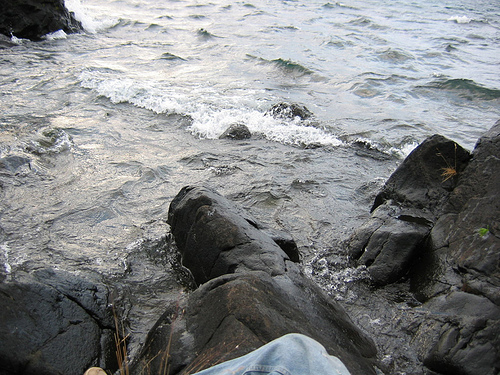
A quiet moment along a Lake Superior shoreline
(*photo
credit)
January 19, 2009
Promote Windpower
for America
Thank God this new
Administration is more committed to renewable energy sources than is
the outgoing one. Of all forms of renewable energy, wind is not
only the fastest growing energy source, (fivefold global increase
between 2000 and 2007), but also the one that could be actualized
more quickly in higher volume than any other. It is needed because
the favored ethanol-based renewable energy includes non-renewable
processing and elevates corn prices for the poor.
Wind potential is
present. The Great Plains from Minnesota to Texas have already
been the focal areas for new wind farms, but the potential also
exists elsewhere in many parts of our country. Furthermore advanced
wind generators work well with lower wind speeds and expand wind
energy's potential territory. An American map shows wind potential
in the Northwest, the eastern Midwest, parts of Appalachia and the
Great Lakes regions, and along the East and West coasts where a high
concentration of our population lives. America added 4,204
megawatts of capacity in 2008 alone.
Wind energy is
pollution-free. Except for the swishing sound (300 yards away
it is as quiet as a library reading room) and stray birds (directed
elsewhere through certain attached devices), there is virtually no
environmental impact from wind generation. The argument that the
viewscape will be marred by such wind generators is not sufficient
in an age when the atmosphere is already damaged for so many by
non-renewable energy-generation pollutants. Consider the
improvement in environmental quality in replacing a coal-fired plant
by wind turbines with cattle grazing about and the air pure.
Besides, farmers who permit wind turbines get sizeable leasing fees
and still continue farming virtually all their land.
Jobs are available and
costs can be reduced. Wind as a source currently furnishes less
than one percent of America's and the globe's total energy (though
Denmark gets 16% of its energy from the wind). An immense potential
for expansion and jobs exists. In fact, advocates for renewable
energy over non-renewable fossil fuels and nuclear power, say that
unit-for-unit jobs will be approximately the same -- not decreased
by going to a wind and solar economy and that we can speak of an
additional 100,000 jobs to meet increasing energy demand with
economic recovery. The great hesitancy with renewable energy is
initial equipment costs -- but these are low in comparison with new
nuclear power plants. Price declines will result from more
efficient and longer lasting equipment. Wind is a win-win
situation. One gets the energy and yet the economic and hidden
environmental costs are reduced. Much depends on our willingness to
support this form of energy at the state and national level through
tax breaks, incentives, research grants and removal of large tax
breaks for non-renewable sources.
Reference: American Wind
Energy Association <www.awea.org>
Prayer:
Lord inspire us through the Spirit's rushing wind to champion the
effectiveness of the physical wind all about us.
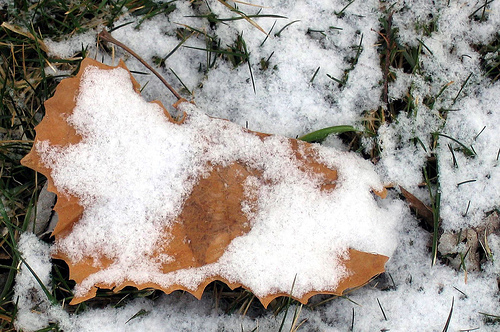
A light dusting of snow
(*photo
credit)
January 20, 2009
Pray for our President
Today is Inauguration
Day in the United States. Barack Obama is becoming the 44th
president of this country and he has his work cut out for him.
Beyond the pageantry, marches, bands, speeches and balls are
critical problems -- and we all seem to know it. The first day of
celebration will soon end and the real work will begin -- and that
is all the more reason to give some time to prayer today.
Because of the seriousness
of these times, I have changed this daily reflection from what I
first wrote back in November. Rather than comparing the new
president with Abraham Lincoln or Franklin D. Roosevelt who were
both first inaugurated in times of national crises, let us see this
occasion as unique with its own problems. Let us consider that
Obama has to be himself and no one else. The comparisons can come
years later after most of us are gone. Obama is certainly no
superman nor should we expect him to be; he has important decisions
to make in a variety of arenas (defense, economics, health care,
energy and others); and he has to tackle these problems
immediately. His decisions will have some long-term effects -- and
that is all the more reason for our prayers.
First, we pray that Obama
and his cabinet and advisors stay cool, collected, steady,
listening, and safe. They have to be ready to work as a team from
the start; they have to filter out the noisy world of partisan
interests and still allow the words of wise people to penetrate the
recesses of the Oval Office.
Second, we are a
democratic people; we take part in the governing in so far as we
support what our leaders are doing or attempting to do -- on in
criticizing them when we regard them to be in error. So we pray
that the American citizens will support the Obama Administration in
a positive and constructive way, especially in its initial phases,
and to call this administration to task when it caves in to the
immense pressure of special interests.
Prayer:
Lord, look kindly on our new president and give him the strength of
character, the right judgment and the physical and mental health
that it takes to perform the difficult tasks ahead. Also help our
nation to realize that the times call for cooperative efforts on the
part of all our citizens. Soften the hearts of those who want to be
negative. Give those who are moved to speak to do so with honesty
and integrity. Allow us all the patience to expect that changes
will take time if placed in a proper order. Give Barack Obama the
courage and strength to govern wisely and well.
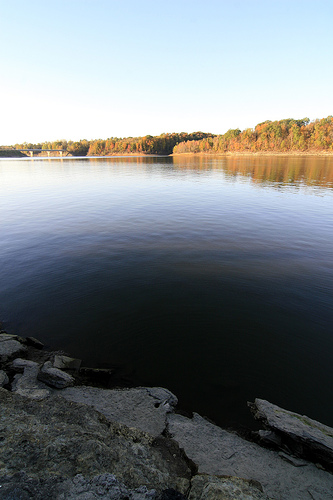
A chilly morning scene
(*photo
credit)
January 21, 2009 Make a
Forest Pledge on National Hug Day
On National Hug Day give
this sign of endearment to a special friend -- and don't forget
trees. I "hug" trees to measure their girth accurately (my
extended reach to outstretched arms and to the ends of my middle
fingers is exactly six feet and each hand width is six inches). If
you don't want to hug trees for either emotional or practical
purposes, at least make a pledge to support our forests and their
trees:
Knowledge --I will
be a champion of a healthy diverse forest and resolve to know the
multitude of plants that compose the forestland understory;
Commons -- I affirm
the commons of all forestlands and the materials that grow therein.
We are stewards of the lands under our control and not absolute
arbiters of forest practice. Thus we are accountable to those laws
and regulations that will preserve forests for future generations;
Value -- I believe
that forest plants have an intrinsic value apart from current or
future economic uses. Their presence and biodiversity are a rich
treasure worth espousing, preserving and describing to others;
Respect -- I respect
the private ownership and boundaries of other forestland property
holders and will not trespass or remove plants from these lands
without their owners' permission;
Prudent Revelation
-- I refrain from telling others about any species that could be of
economic value, unless I am certain the person will not over-harvest
or encourage others to mistreat the plant in an unsustainable
manner;
Protection -- I
will not introduce exotic and invasive species into the forest and
thus threaten the native ecosystem, nor will I engage in or allow
unsustainable logging of the forestlands under my control;
Preservation -- I
will not remove or encourage others to remove forest plants that are
rare, endangered or threatened species, or that need special
protective measures;
Enhancement -- If
physically able, I pledge to improve the quality of my private or
neighboring public woodlands by careful forest management that
includes removing exotic species that threaten the biodiversity of
the forest understory;
Green Economics -- I
pledge to champion economically viable non-timber forest products
that will, in turn, demand a healthy forest as a canopy.
Sustainable Harvest
-- I will only take from the forest for economic or other reasons
only modest amounts of a plant and in a manner that will allow the
plant to reproduce and thrive.
Promotion
-- I pledge to promote the benefits of the forests of my region,
nation and world.
Prayer:
Lord, help me to keep my forest pledge.
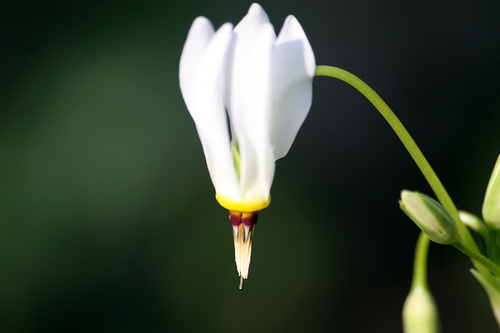
Shooting Star, Dodecatheon meadia
(*photo
credit)
January 22, 2009
Care for the Car
Automobile care is a
serious consideration in the roughest weather, and so it is natural
that we should give some extra tender loving care to our vehicle(s)
in January. This reminder is as much for me as for you. Let's be
more aware of tires, brakes, battery, windshield wipers and lights
just in case we have special needs this month. Place flashlights,
extra clothes and even a sleeping bag in your vehicle. I live in an
emergency evacuation zone being downwind from an army depot that
stores nerve gas. Other readers may be downwind from at least a
winter storm.
Good regular
maintenance. Autos give better service when cared for properly,
such as with routine oil and oil filter changes. One mechanic tells
of a new car that never had an oil change in twenty five thousand
miles -- it was essentially ruined when it should have had ten more
years of life. Such things happen. All drivers can check the fluid
levels in a radiator, batteries, window wash container, transmission
and motor oil. We ought to have regular checkups so that the auto
specialist looks over everything with even more thoroughness than we
do. Some would add that winter is a good time to have the car
washed to remove road salt.
Intermediate and
extraordinary maintenance. At a more intermediate level,
remember to have gas filters checked. Then there's the timer belt,
which will need changing after a period of time depending on the car
model (usually about 60,000 miles). This is the time to consider
spark plug replacement, brake performance,
a thorough look at engine
performance, and to have the exhaust system inspected for rusting
and punctures. A tune-up is often worth about 10% in gas mileage.
A regular car "doctor" takes pride in alerting us to unsuspected
needs. Even if the extraordinary inspections are done by the state
or city, it is good to know a thorough diagnosis of the vehicle has
been made. We should all stay alert for any strange sounds and
watch mileage per gallon to determine whether there has been a
sudden loss in efficiency of the vehicle.
Tire care. New
tires (especially radial ones) are some of the soundest investments
for highway safety and fuel efficiency, giving up to ten percent
better mileage. Most drivers know that proper inflation adds to
better wearing tires, and brings the very welcome benefit of fuel
economy. Check tires for excessive wear especially after hitting a
curb or object in the road.
Start-Up and driving
time. We like to jump in and drive away. The conscientious
person will start and idle the car for a short while and then start
out at moderate speeds. We need constant reminders to drive within
the speed limits; this adds to the life of the car and saves fuel
as well (a twenty percent savings, if within limits as opposed to
driving fifteen miles over).
Prayer:
Lord, help us to care for our vehicle(s); it is good economics; it
is a protection for riders and others as well.
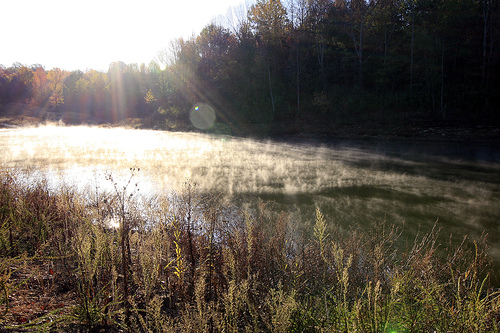
Fog rising on a chilly morn. Taylor County, Kentucky
(*photo
credit)
January 23, 2009
Reuse Materials
Economic conditions remind
us that during the Great Depression people were far more economical
in the way they handled their possessions. Maybe 2009 is the time
to consider reusing more of the resources all around us. We know
that it takes more energy and resources to extract, grow, transport,
fabricate, advertise and sell the items we use -- and often such
items are underused. It is a waste of resources to acquire, store,
and fret about things that have little use. Here are some hints to
avoid doing so:
* Take items to a flea
market or generate a yard sale, which is a popular market
during economically difficult times. One person's junk is another's
treasure, a saying that becomes a reality now. Strive not to be a
collector of what others discard, but always be on the lookout for a
needed item. Going to a yard sale requires a certain discipline so
we do not perpetuate the acquiring of unneeded items. One solution
is to list needed items prior to going. Impulsive buyer, beware!
* Strive to get the very
old items to a museum or into other public uses. Remember, if you
have kept items around long enough, they may become antiques and
repay their storage costs. Half of the types of tools I used as a
kid are museum pieces today.
* Refurbish old furniture
or doors for needed furnishing such as tables and book shelves.
Some people have a particularly creative eye to reusing such items.
* Reuse containers for
storage and make them attractive enough so that they can be
prominently displayed on open shelving in the living and office
space.
* Turn the store room into
a pleasant guest room where people can spend a fascinating evening
looking through your own treasured items. They may even want one or
another item.
* Learn to recycle
Christmas gifts or add a little trim to make a very creative present
for special occasions.
* Make unneeded furniture
available to others. People moving into your town may have to
refurnish their homes and your discards will help if you furnish
them a listing.
* Look for artists who
like to work with materials such as unique older appliances or
tools. They may be happy to reuse what you have allowed to collect
dust for only too long.
* Reuse building
materials. A major area of waste with immense creative
possibilities is the ever-growing amount of used and salvaged
building materials. Think reuse.
Prayer:
Lord we can't take it with us, so let us learn to share it before we
depart. It is of more value to others.
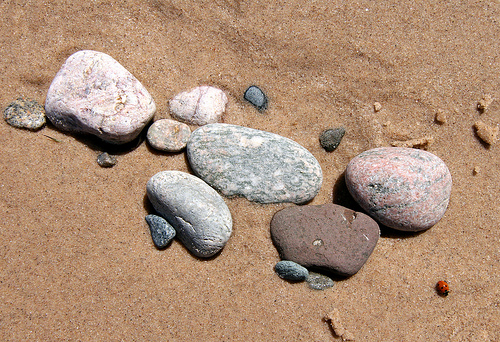
An array of stones, many colors
(*photo
credit)
January 24, 2009
Speak up for Ecumenism
In the week before the
feast of St. Paul many Christians pray for unity among the
worshipping bodies -- and the motivational movement towards this
unity is called "ecumenism." Ecumenical is derived from
Greek and means "the whole world." This program to bring about unity
is not limited to divided Christian bodies but can be extended
everywhere, from the unity of family, to that of citizens working
together, to our country and to the people of various faiths
throughout the world. Differences exist but they should not be
sources of friction or isolation. We must work together to save our
people, our quality of life and our planet itself. There are too
many things that must unite and not divide us from the coming
together of Christians to those who are believers in the Book, to
trusting people of various world religions, and to people who do or
do not follow a specific religious practice. That all may be one.
Our journey to God
involves being who we are and still willing to share in such a way
that we allow others to be who they are at the same time. Openness
and acceptance are the atmosphere in which a meaningful dialog may
occur. If our collective purpose is peace and justice among all
people, we already share something very important -- a lofty goal of
talking with others at this critical moment in history. We do not
set pre-conditions or doctrines of belief for such a dialog; we
accept where we are on the journey and feel comfortable talking with
others who may be quite different, but who also share our desire for
peace and justice.
For many of us who believe
in an eternal future, the urgency does not primarily rest in sharing
our beliefs so much as in sharing where we are. If we firmly
believe, we are comfortable in our trust that God will make all
paths straight. Our own immediate testimony to these others is not
in the details of our doctrine but in the atmosphere of comfort we
find in our belief. If we believe in a personal God -- as
Christians do -- then our personal integrity becomes all the more
important in the conversation with others. Our God makes us more
personable in dialog with others.
If we know Jesus, we know
the Father. They are one in a holy unity, which we are invited to
learn about, to discover, to become one with and to enter into as a
final destiny -- and this unity motivates us to seek further unity
among all people of good will Some of the war-like and greedy do not
seek peace and justice and thus their dialog becomes limited. More
important than our ability to speak to each and everyone is our
desire to do so. The precondition to unitive discourse is a
readiness to work together in peaceful and just ways, not a
capitulation as to doctrine. The dialog is one that is bathed in
love -- and that makes such action godly. The dialog must beget
because the critical times demand it. We are called to speak in an
atmosphere of mutual love.
Prayer:
Lord give us insight to see that in unity comes strength and a
clearer message of peace and hope to all people.
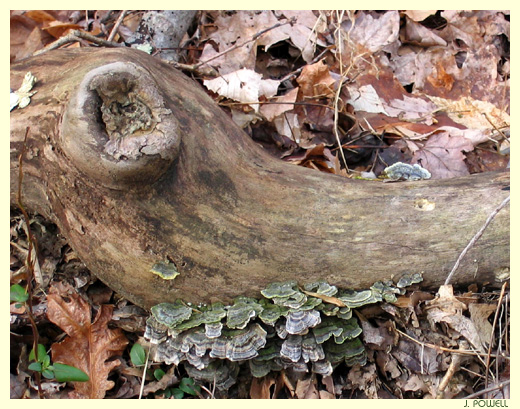
Forest
log with brightly colored fungi. Parksville, Kentucky
January 25, 2009
Celebrate St. Paul's Day
Celebrating St. Paul's Day
is part of the Pauline Year, when we highlight his 2,000th
birthday (estimated as to the original date). One way we could
celebrate without knowing exact dates is by helping establish the
unity Paul so desired in his writings. We should reflect on our
attitudes and actions with regard to ecumenism -- the principles or
practice of promoting cooperation or better understanding among
differing religious faiths. As said in yesterday's reflection, the
time is right in our troubled world to unite with other people of
good will. We ought to begin from within the arena of Christian
bodies and move out to others. We are aware that some folks prefer
isolation, segregation and divisiveness. Limiting our intercourse
to people of good will is not contrary to ecumenism; we are limited
people, and time is short. We must work with all whom we find
cooperative.
Some would like to begin
unity measures with the roots of division and stress differences
through a rather historic approach. Others prefer to discuss
theological differences from an academic standpoint. A third body
of believers perceives need for unity on a host of everyday matters
from political and economic stability to caring for the Earth;
these are convinced that working together to lower the barriers that
separate us is the best way to generate a cooperative spirit that
manifests the openness and acceptance of others. Believers are
convinced that success in cooperative efforts is possible with God's
help. Sometimes people bite off too much, as a number of us once
did with the North American Conference on Christianity and Ecology
in 1987. The actual conference was successful, but the aftermath of
planning for other activities resulted in infighting. Set a limited
goal and stick with it.
Religious and cultural
practices differ. A prayerful sensitivity is required, for we
realize we are all limited and that misunderstandings may occur but
must we avoided by all parties. Dialog takes time and effort. Many
of us are reminded through general talks, homilies, sermons and
interactive blogs that our efforts must be directed toward ultimate
unity among all people. In his letters Saint Paul shows us that the
way to unity is through deeds of charity. If we are to share an
eternity with others, we should begin now with charity to all. Only
God knows that such irreconcilable differences will vanish.
Disunity is nothing to be elated over. History shows that our
divisions are manifested by fights, terrorism, backbiting and
discrimination. Unity is a goal and need not mean sacrificing what
we hold most dear. In fact, our quest for unity leads us to a
growing sense of compassion for others, even those we may hesitate
to call brothers and sisters. The letters of Saint Paul contain a
treasure of things to remember.
Prayer:
Lord, direct us to read the letters of St. Paul and to see how they
apply within our own lives to our efforts to bring about unity,
first in Christian communities and then among all people on this
planet.
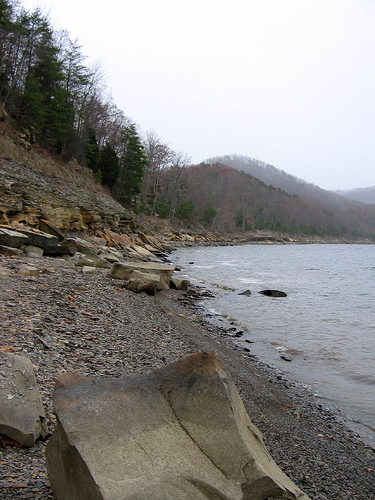
Snow squalls at Cave Run Lake, near Morehead, KY
(*photo
credit)
January 26, 2009
Save Our Hemlocks
One of the saddest tales
that we have heard recently is that the insect, the hemlock woolly
adelgid (HWA), can kill the stately hemlocks of our eastern
mountains in a matter of a few years, once these beautiful trees are
infected. The disaster that is happening is similar to the blight
that befell the American chestnut almost a century ago; various
diseases threaten other tree species today that are under stress
from environmental assaults. This hemlock threat could change the
Appalachian landscape and put stress on wildlife species, which find
a haven in these cool dense trees.
The HWA came from Asia and
was first detected in the western United States in 1924.
Unfortunately, it moved east and came to Richmond, Virginia in the
1950s. From there it spread northward along the Atlantic coast. In
Virginia's Shenandoah National Park 80% of the hemlocks were dead by
2005. The HWAs are continuing to do their deadly work on the
thousands of acres of hemlock-dominated forests some of which are
regarded as old-growth. Recall that some hemlocks can live to be
800 years old.
U.S. Forest Service
managers recommend three methods to control the spread of HWA:
systematic injections of pesticides, insecticidal oils and soaps,
and biological control. For small stands and individual trees the
pesticide-based methods work best. Biological controls are needed
in larger hemlock stands. These involve releasing either of two
nonnative beetles: Laricobuius nigrinus (Lari beetle) or
Pseudoscymnus tsugae (Pt beetle). Both types actively hunt the
HWA as prey, feed voraciously, and eat only HWA. When no HWA are
present the beetles quit reproducing. Needless to say, it is
difficult to rear these protective beetles, which have exacting
requirements for survival and effectiveness.
Residents with hemlock
trees should consider locating bird feeders away from these tree.
HWA can be managed in home and nursery settings if detected early
(white wooly tufts are easily observed clustered on hemlock
branches). The soap solutions must be sprayed on the entire
infected tree; for taller ones (over 30 feet) the spraying can best
be done by a professional arborist. Only spray the infected trees,
for the oil sprays and soaps are not deterrents. Don't fertilize
infected trees, nor use Pt beetles in a home or nursery; that would
be costly and ineffective. Be sure not to brush against an infected
tree and thereby carry HWA to uninfected hemlocks. Report
infestations to your extension agent as soon as detected and obtain
information on the best available treatments for your locality.
Will entire stands of the
American hemlock be lost? Our ancestors spoke about the tragedy of
the loss of the American chestnut and we do not want this repeated.
Let's take measures to protect this precious heritage. <www.saveourhemlocks.org>.
Prayer:
Lord, make us mindful of the need to save all that is precious --
and to see that hemlocks fit this category.

Red-spotted newt (Notophthalmus v. viridescens)
(*photo
credit)
January 27, 2009
Protect Our Wildlife
Wildlife has thrived for
millennia though now it is often threatened by a variety of
environmental stresses such as loss of habitat, and air and water
pollution. We must consider all the ways possible to protect this
valuable component of God's creation.
The larger carnivorous
mammals are threatened by farmers fearing for their livestock and
parents for their children. Wolves have been exterminated in large
parts of our nation. So have the red and grey foxes and the cougars
or mountain lions. These species have only recently made a
comeback, and some wildlife lovers are striving to protect them and
other specific wildlife species. The destruction of predators and
their habitat has led to an explosion of their prey -- rabbits,
squirrel, deer, and turkeys; and regulated hunting seasons are
often not sufficient to bring about control in the manner that
nature handles best. It is heartening to see the expansion of the
coyote's territory to the eastern part of the United States, for
these coyotes are filling an empty niche and are keeping small game
under control.
We are mere observers --
not protectors --of migratory birds, which when winging north or
south need resting, feeding or nesting places. Granted, the geese
and ducks are far more opportunistic than other migratory fowl and
birds; they flourish in our warmer winters by feasting on
uncollected corn in the Mid-American fields. However, many small
birds, which must head further south for food and more comfortable
winter conditions, are disappearing or migrating in greatly reduced
numbers (see January 3). Their flight is all the more reason to
initiate bird protection programs in the form of bird feeding and
sanctuary projects.
Even our native fish may
be threatened and require protection, especially since some of the
world's most abundant fisheries are reaching the limits of their
production and suffering from overharvesting using factory ships and
other modern techniques. We are uncertain whether genetically
engineered fish targeted for fish farming will escape to the wild
and affect the free swimming populations as well. The amphibian
populations (frog, toads, newts, salamanders, etc.) have had
dramatic declines in a number of American states, and biologists are
baffled as to the cause. Some blame pesticides and other
pollutants; others blame natural causes exacerbated by human-made
stresses and reduction of wild space. The winter quarters of the
monarch butterfly cover a very limited area, and these parts of
Mexico are now being affected by development. Add to this, reports
that genetically engineered plants affect these majestic butterflies
in the feeding areas in this country during the milkweed growing
cycle. Are we going to experience the demise of butterflies along
with other species? The threat is all the more reason to grow the
various butterfly attracting plants in special gardens devoted to
these colorful insects. Certainly all wildlife needs protection.
Prayer:
Help us Lord to be protectors of our wildlife.
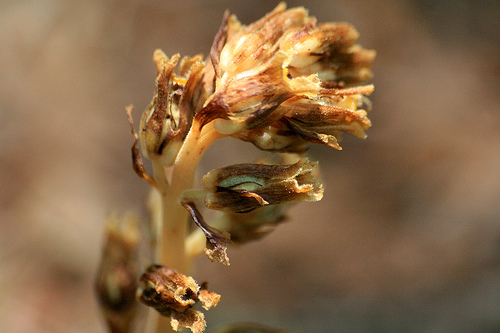
Pinesap, Monotropa hypopithys
(*photo
credit)
January 28, 2009
Treasure Rural Experience
You can take the boy
out of the country, but not the country out of the boy. This
adage is repeated by the many Americans who have left farm life and
now live in towns, suburbs or cities. We farm escapees or exiles
may desire to continue and intensify our country identity, and to do
so as a yearly or year-round experience, for example, through
returning to farming after retirement, helping out during the summer
on a farm, or (in my case) through gardening on a regular basis.
January always brings back
remembrances of farm life. Maybe it was the month with the harshest
weather to endure and the month with the least outdoor farm work.
It was difficult leaving the stove and going out to do farm chores.
But it is also a time to reminisce about the things that make you a
country "boy" all your life. Here are several rural patterns worth
mentioning:
* Weather -- You can
step outside and know what it is going to do today -- it didn't take
a weatherman to tell you. You know.
* Outside -- You
feel uneasy being indoors when the weather is pleasant and it is
daylight, for there could be outside things to do. It is part of
being ruralolic.
* Animal Ways -- You
can size up the way a cow is going to turn by just looking at it
from a distance. You know how to take care of animals when they are
sick and how to give them some distance when they are mean. No one
tells you. You know.
* Outdoor Work --
You know when something has to be planted and that waiting for a
week could be the wrong strategy. You know how to pace yourself in
working in the hot sun. If you overexert, no one else is to blame.
* Orderliness -- You
enjoy seeing a well-kept place with fences and gates in working
order and good farm buildings. You know how much effort it takes to
make straight and evenly spaced rows of corn and other field crops.
* Seasons -- You
know the year begins with winter, for that is the first of the
growing season, when daytime lengthens and when the sap starts to
rise and the roots start to extend themselves. You don't start the
year in spring, for life begins in winter.
* Directions -- You
know how to get your bearing quickly and how to regain direction;
you can size up the lay of the land, how water flows, and what are
sunny and shady places.
* Farming Gifts --
You know the people who are not energetic enough or smart enough to
farm successfully. And you know how dead wrong urbanites are when
they look down on rural people.
Prayer:
Lord, we thank you for our past experiences.
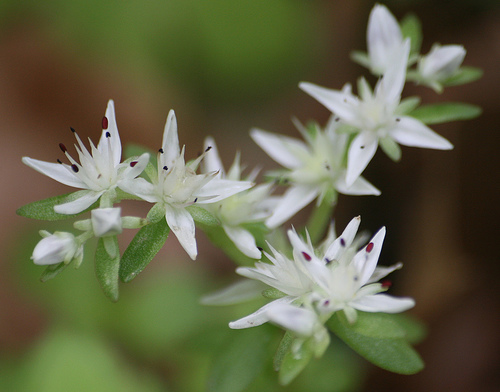
Stonecrop, Sedum ternatum
(*photo
credit)
January 29, 2009
Question Retirement
Make hay while the sun
shines. People
sometimes think I am in retirement. For the record, I did retire
from management of a public interest center in 2002 after exactly
twenty-five years at that job. But I did not retire from pastoral
ministry or public interest work. No the "R" word is something I do
not believe in and, for Jesuits, when we can no longer do active
work, we must pray for others on a more formal basis (since we are
to pray always). Good health is such a blessing that when we have
it at whatever age, we must use it in the service of others. If one
means by "retirement" halting the particular work in which one is
engaged, then it becomes a confusing designation, since so many
people change jobs.
Some speak with pity that
retirees must return to work. Regard the return as a blessing!
Work gives meaning to life and is a healthy thing to do. Often the
so-called early retirees such as military and other governmental
workers who enjoy good health and accumulated experience are ideal
candidates to be volunteers at the service of the less fortunate
both in this country and overseas. God's call comes to more than
the youthful in life's springtime. Today, retirees can fulfill the
prompting of the Spirit to be of service as elder volunteers.
Such opportunities are
indeed plentiful as volunteer services: civic and church outreach
work for the poor, school auxiliary and literacy training programs,
prison visits, work at drug rehabilitation centers, health and
paralegal services in centers for poor folks, and work as auditors,
writers, or fund raisers for social, civic, or charitable
organizations. Older volunteers bring more than just good will;
they offer wisdom and experience that will enhance the effectiveness
of the organization. With more time to spare the elder can show
genuine hospitality and the ability to listen to those in need. The
networking aspect of elders who know the community is really an
important social asset. The day of the wise elder is returning, and
community leaders are seeing the benefits of local people donating
their services.
Senior citizens may have
time now to further their own neglected education, an ideal time to
shift from being a worker to a student. Some colleges offer
discounts to senior citizens in a number of fields. Mobile seniors
prefer the popular Elderhostel non-credit programs. These
are conducted in a variety of subjects using facilities that are
otherwise not occupied, such as colleges in summer, or summer camps
not in traditional use. These senior-related programs were started
in 1975 by Marty Knowlton and became immediately popular; today
many people so favor certain favored programs that they have to sign
up early in order to be included.
Prayer:
Teach us Lord to see that retirement can be quite selfish if the
person still has the health and energy to be of service to others.
Help others to retire as a last resort.
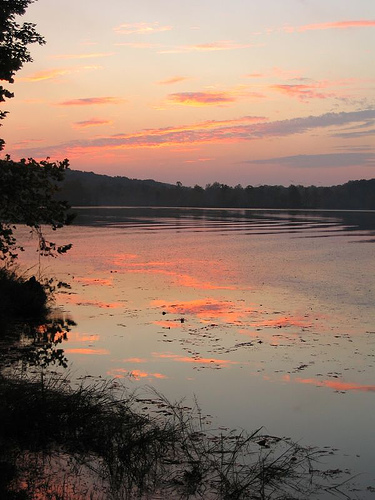
Sunset at Energy Lake, Western Kentucky
(*photo
credit)
January 30, 2009
Search for Community
People today seek
community: all migrants, the homeless, college students away from
home for the first time, the immobile and elderly, youngsters lost
in a large school, unorganized workers, those who move to a distant
city. Some community seekers are lured by purveyors of drugs, sex
or alcohol; others by the millions seek company on the Internet.
Others wander about finding that existing communities do not satisfy
them. In some ways we are all seekers and our hearts will not rest,
as St. Augustine says, until they rest with God. Thus it is not
wrong to search for a future eternal community, for no earthly one
fully satisfies.
Being social beings, we
move out and seek groups with whom to associate for our welfare
individually and collectively. We become aware that some
communities on Earth will direct us to God, can be the foretaste of
the celestial Jerusalem, and can be a consolation to other fellow
seekers. The searching takes many forms, and so we see the
evolution of a great variety of associations. Some of the tasks
that we sense are needed require more than what constricted and
locally-based communities can do -- no matter how effective they
prove to be at the local level. Saving our planet from the masters
of the globalized economy requires globalized regulatory powers and
that means a supporting global community that transcends the local
one.
The kingdom of heaven
is like a mustard seed that a person took and sowed in a field. It
is the smallest seed of all the seeds, yet when full grown it is the
largest of plants. It becomes a large bush and then birds of the
sky come and dwell in its branches.
(Matthew 13:31-32)
This passage tells us who
seek community several points:
* Communities must be
sowed by people and be allowed to grow in the field.
* Communities need to
start small and grow with time. The Lord said they were the
smallest, and I remember one mustard plant in our solar greenhouse,
which grew to the ceiling twelve feet high -- and no other plant
ever beat it in height;
* Communities allow for
the full potential development of members. There needs to be some
recognition of the various talents of the individuals in community
and thus the branches are all attached and yet are different;
* Communities are willing
to share with others especially those less fortunate. When it is
full-grown the community is able to serve the needs of others and
not remain isolated. Such communities are good for the total
environment and a place for birds to come and gather.
Prayer:
Lord, allow us to be both
builders of earthly communities and seekers of a heavenly community.
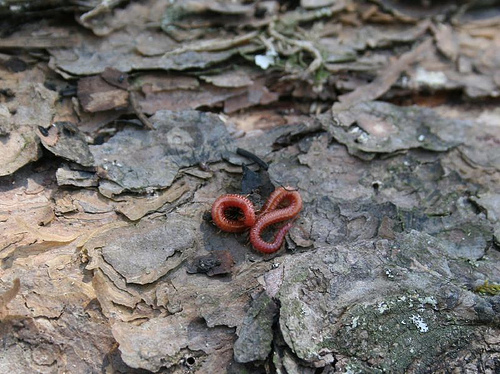
Scolopendromorph (centipede), curled upon a log
(*photo
credit)
January 31, 2009
Declare all Time Extraordinary
Tomorrow we speak of the
"Fourth Sunday of Ordinary Time" and we may question what "ordinary"
means. Is all life just ordinary? We hear of someone's passing and
think for a moment that he or she lived an "extraordinary" life.
Then in the next moment we see how great are the special troubles
and crises of our own age and regard them as out of the ordinary.
Maybe "ordinary" means something like the liturgical Sundays or an
ordinal number used to indicate order and nothing more. Life
contains something of the extraordinary. History is more than
narratives of generals and royal figures and includes the
extraordinary found in ordinary folks through the ages. Was it not
the nameless people who made victories and successes memorable and
who are candidates for the "Tomb of the Unknown Soldier"?
Time is always
Extraordinary and so are people. For years I have received a
Valentine's Day greeting from Elizabeth and David Dodson Gray, and
since it is the only one I have consistently received, it is very
special to me. One was a single eight-and-a-half by eleven red and
white sheet with the quotation "We have so little time to be born to
this moment" by Saint-John Perse (pen name of Alexis Leger, the 1960
Nobel Prize winner in literature). The present moment is neither
past nor future, not the awesome length of history from whence we
came, nor the infinite future toward which we are destined. It is
the NOW in our lives. To make it the center of our existence is to
truly live this moment in a very extraordinary way, for no other
time is colored in the uniqueness of this moment. It is here in an
instant and then recedes into a memory which fades as we age and
fail to record it.
The average life of 75
years has 900 months, 27,384 days, about 657,216 hours and almost
39,433,000 seconds. Think of it, not a single two of those hours or
even seconds are the same. They are unique but not recognized as
such, and we forget to value their uniqueness even when they are so
numerous.
We are the ones who help
create the extraordinary. We do this by our enthusiasm, "the God
within." God works in and through us at each moment of our lives,
and that is wonderful creative work, a marvel to behold. Are we
mindful of this presence all around and within us? Some of us are
more drawn than others to thank God for being alive; this is
especially true of cancer survivors and the recipients of
transplanted organs. Others are grateful for a long and productive
life and regard their offspring as a source of joy and pride. We do
not create much if anything, but we are invited to help co-create
the present moment to be unique, to be a time linking the whole
miracle of our past and the miracle of what lies ahead in our
future. The more intensely we create this moment, the greater will
be the enthusiasm for seeing how extraordinary it is.
Prayer:
Lord, help us see the extraordinary in our lives and to see that
your special favors make it so. Fill us with gratitude.